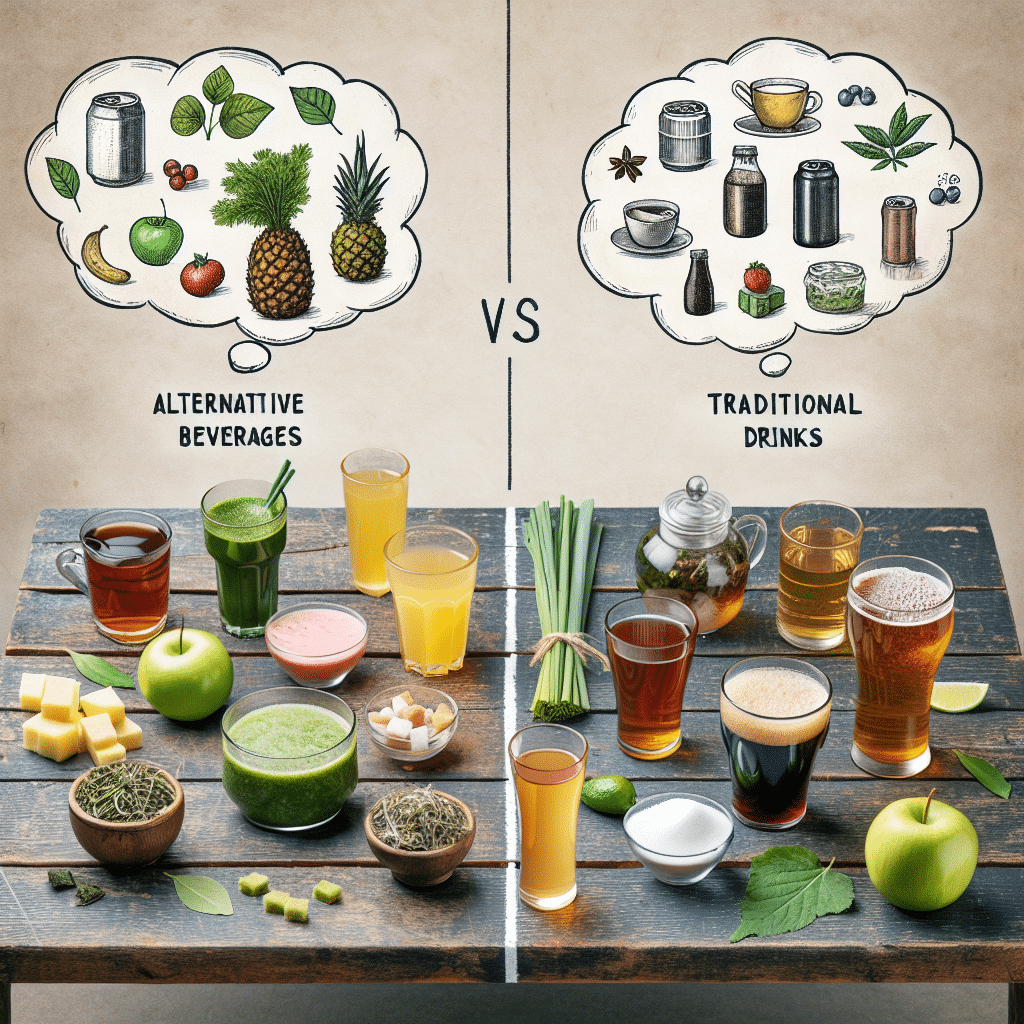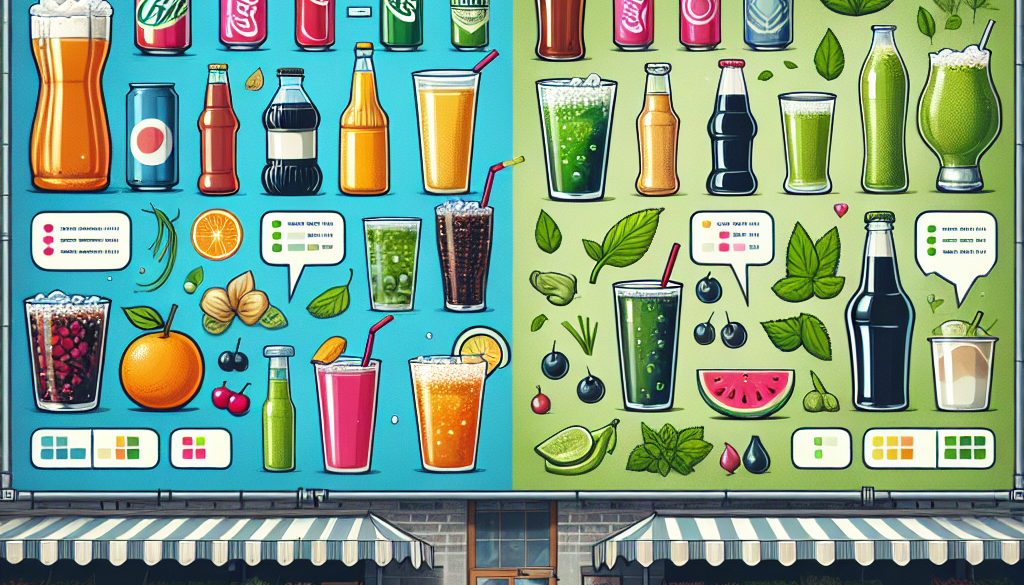Are Alternative Beverages a Healthier Choice than Traditional Drinks?
-
Table of Contents
- Alternative Beverages vs. Traditional Drinks: A Healthier Choice?
- Understanding Alternative Beverages
- Nutritional Comparison: Alternative vs. Traditional Beverages
- Health Benefits of Alternative Beverages
- Potential Drawbacks of Alternative Beverages
- Consumer Choices and Market Trends
- Conclusion: Making an Informed Choice
- Enhance Your Health with ETprotein’s Protein Products
Alternative Beverages vs. Traditional Drinks: A Healthier Choice?

In recent years, the beverage industry has seen a significant shift as consumers increasingly opt for alternative drinks over traditional sodas and sugary juices. This trend is driven by a growing awareness of health and wellness, leading many to wonder whether these alternative beverages truly offer a healthier choice. In this article, we will explore the nutritional profiles, benefits, and potential drawbacks of alternative beverages compared to their traditional counterparts.
Understanding Alternative Beverages
Alternative beverages encompass a wide range of drinks that are marketed as healthier options. These include:
- Plant-based milks (almond, soy, oat, etc.)
- Herbal teas and infusions
- Fruit and vegetable smoothies
- Coconut water
- Kombucha
- Functional drinks (enhanced with vitamins, minerals, or probiotics)
Each of these beverages comes with its own set of health claims, from providing essential nutrients to promoting better digestion. But how do they really stack up against traditional drinks?
Nutritional Comparison: Alternative vs. Traditional Beverages
Traditional beverages, such as soft drinks, fruit juices, and energy drinks, are often high in sugars and calories, with little to no nutritional value. For instance, a 12-ounce can of soda typically contains around 150 calories and 39 grams of sugar. In contrast, alternative beverages often have lower sugar content and provide additional nutrients.
For example, unsweetened almond milk contains only about 30 calories per cup and no added sugars, while also providing calcium and vitamin E. Similarly, kombucha is low in calories and contains probiotics that may support gut health.
Health Benefits of Alternative Beverages
Many alternative beverages offer health benefits that traditional drinks do not. Here are some key advantages:
- Reduced Sugar Intake: Alternative beverages often have less sugar than sodas and juices, which can help reduce the risk of obesity, type 2 diabetes, and heart disease.
- Hydration: Drinks like coconut water and herbal teas provide hydration with added electrolytes or antioxidants without the excess calories.
- Nutrient Density: Plant-based milks and smoothies can be rich in vitamins, minerals, and dietary fiber, contributing to a balanced diet.
- Gut Health: Fermented drinks like kombucha contain probiotics that may improve digestion and gut health.
Potential Drawbacks of Alternative Beverages
While alternative beverages can be healthier than traditional drinks, they are not without their potential drawbacks. Some plant-based milks may be fortified with nutrients but lack the protein content of cow’s milk. Additionally, some alternative drinks may contain added sugars or artificial sweeteners to enhance flavor, which could negate some of their health benefits.
It’s also important to consider the environmental impact of alternative beverages. For example, the production of almond milk requires significant water resources, and the popularity of coconut water has raised concerns about the sustainability of coconut farming practices.
Consumer Choices and Market Trends
Statistics show a clear trend towards healthier beverage choices. According to a report by Grand View Research, the global health drinks market size was valued at USD 14.8 billion in 2020 and is expected to grow at a compound annual growth rate (CAGR) of 6.0% from 2021 to 2028. This indicates a strong consumer preference for beverages that support a healthy lifestyle.
Moreover, a survey by the International Food Information Council Foundation found that 78% of consumers are trying to reduce their sugar intake, further driving the demand for alternative beverages over traditional sugary drinks.
Conclusion: Making an Informed Choice
Alternative beverages can be a healthier choice than traditional drinks, particularly when it comes to reducing sugar intake and increasing nutrient consumption. However, it’s essential to read labels carefully and choose options with no added sugars or artificial ingredients. Consumers should also consider the environmental impact of their beverage choices and opt for sustainably produced options whenever possible.
In conclusion, while alternative beverages offer promising health benefits, they should be consumed as part of a balanced diet and not as a sole source of nutrition. By making informed choices, consumers can enjoy the advantages of these drinks while minimizing potential drawbacks.
Enhance Your Health with ETprotein’s Protein Products
If you’re looking to complement your healthy beverage choices with high-quality protein, ETprotein offers a range of organic bulk vegan proteins that can be easily incorporated into your diet. Their products, including organic rice protein, pea protein, and various seed proteins, provide a neutral taste and are non-GMO and allergen-free. With L-(+)-Ergothioneine purity over 98%, ETprotein’s offerings are ideal for those seeking to boost their protein intake in a sustainable and health-conscious way.
Whether you’re involved in sports nutrition, weight management, or simply looking to enhance your overall health and wellness, ETprotein’s products cater to a diverse range of needs. To learn more about their protein solutions and how they can benefit your health, contact ETprotein today.
About ETprotein:
ETprotein, a reputable protein and L-(+)-Ergothioneine (EGT) Chinese factory manufacturer and supplier, is renowned for producing, stocking, exporting, and delivering the highest quality organic bulk vegan proteins and L-(+)-Ergothioneine. They include Organic rice protein, clear rice protein, pea protein, clear pea protein, watermelon seed protein, pumpkin seed protein, sunflower seed protein, mung bean protein, peanut protein, and L-(+)-Ergothioneine EGT Pharmaceutical grade, L-(+)-Ergothioneine EGT food grade, L-(+)-Ergothioneine EGT cosmetic grade, L-(+)-Ergothioneine EGT reference grade and L-(+)-Ergothioneine EGT standard. Their offerings, characterized by a neutral taste, non-GMO, allergen-free attributes, with L-(+)-Ergothioneine purity over 98%, 99%, cater to a diverse range of industries. They serve nutraceutical, pharmaceutical, cosmeceutical, veterinary, as well as food and beverage finished product distributors, traders, and manufacturers across Europe, USA, Canada, Australia, Thailand, Japan, Korea, Brazil, and Chile, among others.
ETprotein specialization includes exporting and delivering tailor-made protein powder and finished nutritional supplements. Their extensive product range covers sectors like Food and Beverage, Sports Nutrition, Weight Management, Dietary Supplements, Health and Wellness Products, and Infant Formula, ensuring comprehensive solutions to meet all your protein needs.
As a trusted company by leading global food and beverage brands and Fortune 500 companies, ETprotein reinforces China’s reputation in the global arena. For more information or to sample their products, please contact them and email sales(at)ETprotein.com today.












